Halfway through writing my last book, I hit a wall.
I had time set aside each morning when I was supposed to write. But for weeks I couldn’t get myself to open the manuscript, much less write. Instead of writing, I’d do other things like tidy up my work area, work on a different project, or just waste time on social media.
I was procrastinating
So often it’s the most important tasks that are the hardest for us to find the energy to perform.
- Writing that paper
- Doing the laundry
- Making that phone call
At the end of the day, procrastination is a motivation problem. And the way to overcome procrastination is to first understand how motivation actually works.
In this essay, I want to show you how motivation works so you can stop procrastination once and for all.
The Motivation Equation

If you prefer to listen, this essay is also available on podcast.
The best way I’ve come up with for thinking about motivation is what I call “the motivation equation.”
Here’s the equation:

As simple as it may seem, you can use this equation to identify exactly where your procrastination is coming from. Then you can address the source of your procrastination directly so you can get back to what God has called you to do.
If you hate math, here’s what the motivation looks like if you write it as a sentence:
I am going to accomplish Task because Reason by doing Plan in spite of Pain.
Or if we want to get cutsie with it, we might say…
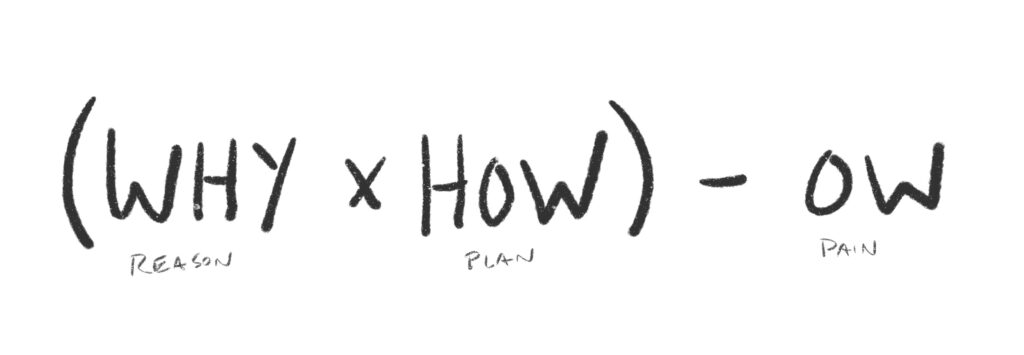
A few examples:
- I will run a marathon (Task) because I want to prove to myself I can do it (Reason) by doing Caleb’s marathon training regiment (Plan) in spite of how hard I know it’s going to be (Pain).
- I will write a book because it will honor God and serve the church by writing for 90 minutes every morning in spite of the pain of having to go to bed earlier.
- I will do this laundry because it will serve my family who I love by starting with bringing the whites basket downstairs in spite of the fact that I’d rather just lie down.
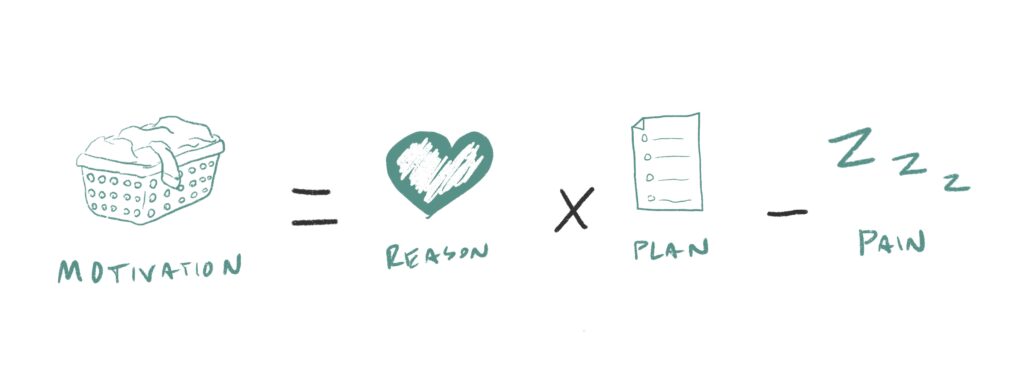
Like any equation, the result of the motivation equation can be positive, negative, or neutral.
When you have positive motivation, the work is easy and even fun to do. You do the thing you need to do with minimal friction. You hardly even need to use willpower because you want to do it.
When motivation is neutral, the task is more difficult. But usually, you can still get yourself to do it by applying willpower.
But when motivation is negative, you will find yourself actively avoiding your obligation. It feels almost painful to do what you should be doing. So we delay, defer, and procrastinate.
Ideally, then, we want to find a way to tilt the motivation equation toward the positive when it comes to the things we ought to be doing. And the way we do this is by understanding each of the three variables:
- Reason
- Plan
- Pain
Once you grasp how these three variables work, you’ll be able to tweak them to find motivation the next time you’re procrastinating.
Let’s start with the last part of the equation: Pain. Because that’swhere our trouble with motivation starts.
Pain
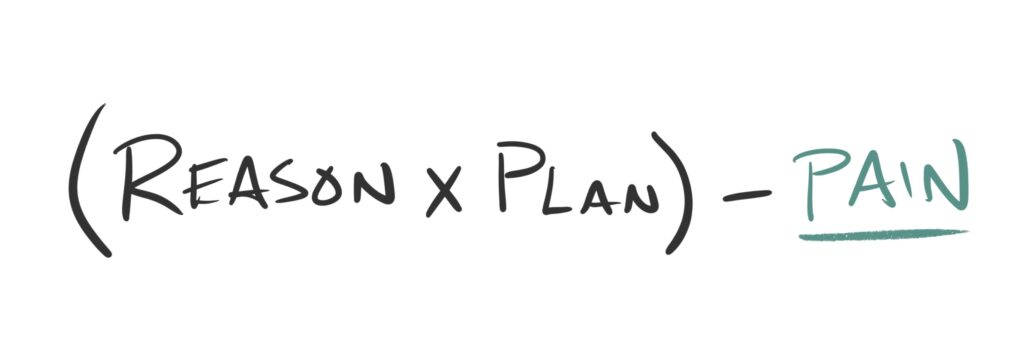
Any productive activity will have some degree of pain to it.
It’s a product of the fall wherein our mandate to “be fruitful and multiply” was subjected to increased difficulty because of the curse.

But this doesn’t mean work is entirely miserable. We were created for meaningful labor. So even in a post-Genesis 3 world, our work is often still satisfying, exciting, and meaningful. But even in the most fulfilling work we still get our fingers pricked by the thistles and thorns of the curse. And some days the pain of doing the work outweighs the desire to do it.
The pain comes in many different forms. It could be that the task is:
- Boring
- Frustrating
- Difficult
- Stressful
- Ambiguous
- Unstructured
- Unrewarding
- Meaningless
That’s when we procrastinate.
Thinking about a task through the lens of the motivation equation, the higher the pain variable the more difficult it will be to find the motivation to do it. In terms of motivation, pain is a negative which is why it’s subtracted from the motivation equation.
I’ll explain more about the reason and plan parts of the equation in a moment, but suffice it to say if your reason and plan are not strong enough, even a small amount of pain is enough to make your motivation neutral or negative.
Pain is why you procrastinate. But you can find motivation for even extremely painful tasks by having a good reason for what you’re doing.
Reason
I ran track and cross country during my freshman and sophomore years of high school.
I never really liked it. Running was painful and I wasn’t very fast. Even today, it’s very hard for me to find the motivation to run.
But I have a friend who is an ultrarunner (100+ mile races). And he does this as a hobby. Somehow he actually enjoys it!
Why is he motivated to run and I’m not? I don’t think it’s that running is less painful for him than it is for me, so what gives? How can one person be so motivated to do something extremely painful, while another person has less than zero motivation to do it?
This brings us to the Reason part of the motivation equation.
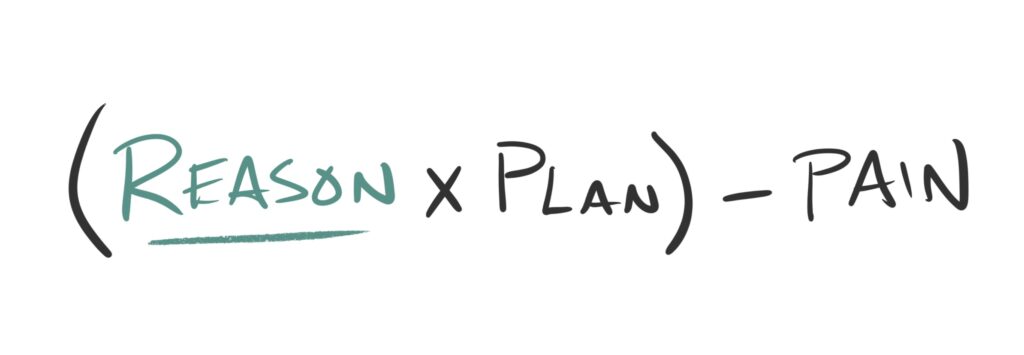
The biggest factor in your level of motivation for any activity is your “why.”
The reason you are doing a hard thing supplies you with motivation for doing it—even if it’s extremely painful. So it follows that if you don’t have a good reason, you won’t have motivation.
I initially started running cross country in high school in the fall as conditioning for basketball in the winter. But when I didn’t make the basketball team my reason for running evaporated. So the following Fall when I started the next season of cross country my heart just wasn’t in it. Running hadn’t become more painful, but I had lost my reason for doing it.
I lost my why.
Here’s how running might look for me if we put it in the motivation equation (ignore the plan component for now).
Motivation to Run = (0 x Plan) – 10
Or expressed as a sentence
- I will run because
I want to be in shape for basketball seasonin spite of how hard I know it’s going to be.
Without a reason, why would I want to deal with the pain of running?
Back to my ultrarunning friend.
He has a stressful job and he’s told me that the long, lonely runs—though physically painful—have become his time to process the day and burn off some of that stress. And as he’s gotten more into it, he’s discovered he’s quite good at it. So how his reason has become even stronger as he enjoys seeing himself improve his times.
How does his motivation equation look?
Motivation to Run = (15 x Plan) – 10
- I will run because it makes me feel better after a long day and gives me a clear goal to work towards in spite of how hard I know it’s going to be.
His reason was greater than the pain. So he has the motivation to keep running.
Recognizing the power that your reason plays in motivation is a massive unlock. It means if you can give yourself a good enough reason, you will find the motivation to do even incredibly difficult things. And this is the way to reverse your lack of motivation at work when your job feels meaningless.
As an aside, this is also how motivation works in the Christian’s life as we walk by faith. If you’ve ever looked at those martyrs who went willingly to their deaths, it wasn’t that the pain of death wasn’t frightening to them. It was that they had a higher Reason—faith in the promises of God.
“Now faith is the assurance of things hoped for, the conviction of things not seen.” (Hebrews 11:1)
If you read through Hebrews 11:1–40, the so-called “hall of faith” chapter, you see this pattern of people doing incredibly painful things because they had the powerful Reason of faith in the promises of God.
We’ll talk more about how Christians can bring godly reasons to bear on even the most mundane tasks of life shortly. But first, we need to address the final component of the motivation equation.
What do you do when you have a really good reason, but you still find yourself unmotivated and procrastinating?
Plan
Plenty of people start off with great reasons for doing something. But they still find themselves lacking the motivation to actually follow through.
- “I’m going to read the Bible this year so I can be closer to God!”
- “I’m going to lose 20 lbs so I can be healthier for my family!”
- “I’m going to finish that project so I can help the company!”
If our reason is really good, how is it that we sometimes still find that pain outweighs the why? It’s because reason is not the only positive contributor to your motivation.
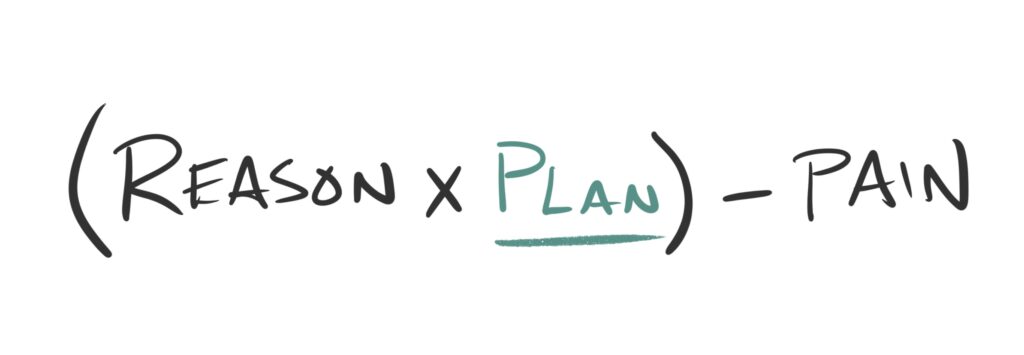
First, notice that it doesn’t say Reason + Plan. This is the crux of the motivation equation.
Since we’re dealing with multiplication, it means that if your reason is a 10 and your plan is a 0, your motivation is still going to be 0 at most. Anything multiplied by zero equals zero. And that’s before you factor in the pain!
Most people stink at sticking with their goals because they haven’t slowed down long enough to make a hyper-specific plan. Having a great reason is important, but Plan is the force multiplier of great reasons.
When we attach a good Plan to a good Reason something incredible happens.
Let’s say you had a task that was fairly painful to do (we’ll say the Pain = 5). But you also have a really strong reason (Reason = 10). And on top of that great reason, you decided to sit down and craft a detailed plan to help you get there (Plan = 10).
Here’s how your motivation would look once you plug those numbers into the motivation equation.
Motivation = (10 x 10) – 5
10 x 10 = 100
Subtract 5
That’s a 95 level of motivation!
Do you see? When you match a great reason with a great plan, it blows the pain out of the water. The result is you don’t procrastinate. You just do what you’re supposed to do.
You’re motivated.
The other cool thing about the Plan factor is that you can even pair a great Plan with a so-so Reason and still find high levels of motivation. Likewise, a really well-thought-out reason for your goal that resonates deeply can often overcome even a mediocre plan. But for the highest levels of motivation and to overcome the most painful tasks, you want to have a great Reason and a carefully crafted Plan.
Now let’s look at how we can practically use the motivation equation to get ourselves to stop procrastinating and start doing what we know we need to do.
Tipping the Equation in Motivation’s Favor
So how does this knowledge help me actually get motivated when I’m procrastinating?
The simplest way is to just pause and ask yourself three questions. These diagnostic questions will help you understand the scope of your motivation problem.
- What about this is so hard to me? (Pain)
- Why is it important that I do this? (Reason)
- How exactly will I get this thing done? (Plan)
You can then mentally tweak each of these variables. It’s just three steps.
1. Minimize the Pain
Sometimes overcoming procrastination is as simple as recognizing that you’ve way overblown the Pain part in your mind.
I do this with phone calls all the time. I’ll put off making a call because I think it’s going to be some big ordeal where I wait on hold forever and never really get my question answered. But nine times out of ten, it ends up taking five minutes and then I can check that thing off my list that’s been nagging me for months.
So start by asking, is this really as painful as I think it’s going to be, or am I exaggerating it in my head?
2. Maximize the Reason
Sometimes you’ll notice that the problem is with your reason. It’s simply not big enough.
A lot of people who set out to lose weight have this problem. They want to get healthy for purely selfish reasons—to look better, feel better, etc. These aren’t bad reasons to lose weight, but they aren’t very big reasons.
It’s better if you can connect your goals to how they serve others “so I can be around for my kids” or there’s the nuclear reason “so I can glorify God by stewarding my body.” Connecting your Reason to the first and second greatest commandments can transform even the lowliest goal into a mission of cosmic significance.
And here’s the crazy thing—if all of our lives are to be an act of worship to God, then those reasons are 100% legitimate and the reason you should be doing whatever goal you have in the first place.
This is also why I always write down the Reason for the goals I set. I need to be reminded of the why. Especially with long-term goals, it’s easy to forget why you started them once you’re in the thick of it. But being able to reference that original why can help supply motivation when you really, really don’t feel like doing it.
If you can connect your why back to how they help you glorify God, your Reason is just that much stronger.
3. Maximize the Plan
As I alluded to earlier, though, usually the big problem people have is they lack a plan. They might have great reasons, and an accurate appreciation for the pain involved, but they haven’t laid out a plan for themselves to follow.
Lack of a plan is the Achilles heel for most goals.
I’ve heard it said that “procrastination is your brain telling you you don’t have a plan.”
If you have a great reason, and an accurate appreciation of the pain involved and you still find yourself procrastinating, it’s time to focus your attention on creating a better plan.
Conclusion
The motivation equation is a powerful tool for overcoming procrastination. And it’s flexible enough to be used in many areas of life.
If you want more help setting effective goals that put God first, I teach a step-by-step process for doing this in the course Goal-Setting and the Glory of God.


This is a good conversation. I liked your including the role of pain. One flip on this can be from our thinking too. All growth is an experience of discomfort (i.e. pain) — of carrying our crosses even — so there is “productivity” even to pain. Thanks for such practical stuff Reagan!
I appreciated how you simplified the issue of motivation. My biggest problem is the plan side of the equation. My emotions usually provide me with a huge reason, but it’s the X’s and O’s (Or lack there of) that stop me in my tracks. Personal organization seems to be a really important element to this effect.
I think plan the missing ingredient for a lot of people. That’s why I’m so obsessed with the question of personal productivity. I see the person I want to be, but I get in my own way when I’m disorganized.